Algarve-Tourist.com
The best independent guide to the Algarve
Algarve-Tourist.com
The best independent guide to the Algarve
Lisbon to the Algarve – the best ways to travel between the Algarve and Lisbon in 2026
The Algarve is the southern coastline of Portugal and one of the country's most popular holiday destinations. Most visitors to the region fly into Lisbon, Portugal's capital and the location of the main international airport.
Several options exist for travelling between Lisbon and the Algarve: express trains, intercity coaches, low-cost bus services, and driving along the A2 expressway. The best choice depends on your budget, your destination in the Algarve, and how much you value comfort over cost.
This guide covers each transport option in detail, with journey times, prices, booking advice, and links to the relevant transport companies.
Overview of travel between Lisbon and the Algarve
The Algarve is a large region, with towns and resorts spread along 150km of coastline. The exact travel details depend on your destination, but here is a general overview of the options:
Private transfer - The fastest and most convenient way to reach the Algarve, but also the most expensive. A private transfer becomes better value when travelling as a group of three or four and splitting the cost.
Driving along the A2/A22 expressways – The quickest driving route follows the A2 expressway as it cuts north to south through the Alentejo region. At its southern end, the A2 joins the A22, which runs the length of the Algarve. The A2 is tolled and surprisingly expensive: the 235km, two-hour drive costs around €21 for a car. The route passes through the interior of Portugal with no interesting towns or sights along the way - For a guide where to stop along the A2
Driving along the Alentejo coastline (N120) – A far more scenic alternative, though it adds at least 90 minutes to the journey. The route follows the N120, a toll-free single-carriageway road that winds through countryside and coastal villages. Some tolls may still apply around Lisbon.
Warning about tolls: If driving in Portugal, understand how tolls work before setting off. Details are provided later in this guide. The toll management company pursues unpaid charges aggressively, issuing fines to foreign tourists even for journeys made years earlier.
Train travel - The most comfortable way to travel between Lisbon and the Algarve. Express trains run from Lisbon to Tunes and Faro, where a regional service connects to towns along the Algarve line. The drawback is that the railway misses many resort towns, including Vilamoura, Alvor, Carvoeiro, and Armação de Pêra, so a taxi is often needed for the final leg. A single fare costs €22 to €30 depending on your destination. All services are operated by Comboios de Portugal (CP), the national train company.
Bus - Rede Expressos - The main intercity bus company in Portugal, with direct services to most Algarve towns. Bus travel is considerably cheaper than the train, with fares typically ranging from €10 to €25. Routes often include multiple stops in the Algarve, though journey times remain comparable to train travel.
Bus, Flixbus - A low-cost operator that has driven down coach fares across Portugal. This is the cheapest option for budget travellers, with fares starting as low as €7 when booked well in advance. Flixbus only serves the larger towns in the Algarve, and the coaches fill up quickly in summer.
Book directly with the transport company rather than through third-party ticket resellers. Direct bookings avoid unnecessary fees, and the companies are more helpful if problems arise. Links to each website:
Comboios de Portugal - www.cp.pt
Rede Expressos - rede-expressos.pt
Flixbus - FlixBus
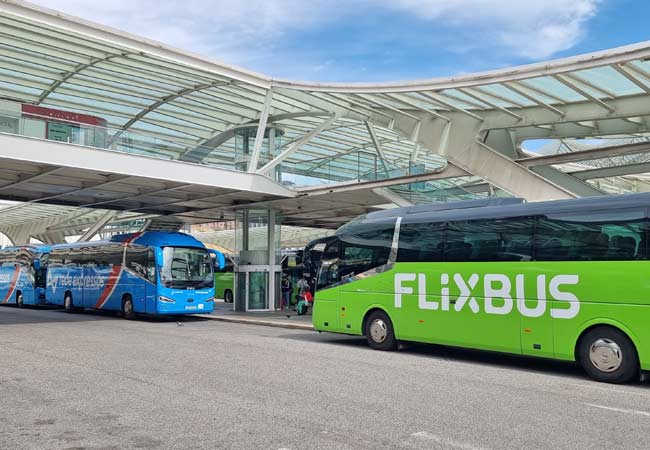
Intercity coach travel in Portugal is safe and comfortable, with both Flixbus and Rede Expressos using modern coaches.
Train, Bus or Low-Cost Bus from Lisbon to the Algarve?
Train travel is the most comfortable option. The carriages are spacious, the seats recline, and the journey passes quickly. The train requires a connection at either Tunes or Faro, but the regional services are timed to align with the express arrivals, making the transfer straightforward if you follow the timetabled routes. The trade-off is cost: expect to pay €10 to €20 more than the low-cost bus for an adult ticket.
Journey times between train and bus are nearly identical. Lagos to Lisbon takes 3 hours 52 minutes by train and 3 hours 45 minutes by bus. Tavira to Lisbon takes 4 hours 2 minutes by train and 4 hours 15 minutes by bus. The difference is negligible.
The bus has one clear advantage: it drops you closer to where you actually want to be. Many popular resort towns sit far from the nearest train station. Albufeira is 7km from Ferreiras station, Vilamoura is 5km away, and Armação de Pêra is 8km away. Unless you plan to take a taxi from the station, the bus is more practical for these destinations.
For most travellers, the train is the better choice. Bus routes through the Algarve wind through countless roundabouts and twisting roads. Jammed into a packed summer coach, that journey feels considerably longer than the timetable suggests.
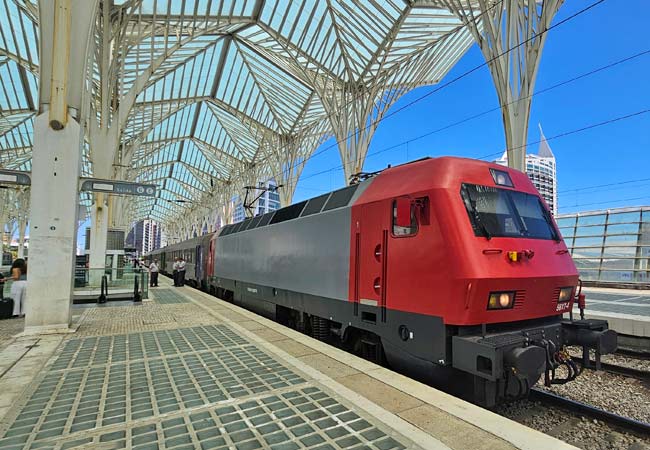
The Intercidades (intercity) train to faro pulling into Oriente in Lisbon
Book your seats in advance
Book train and bus tickets well before your journey. This saves money and guarantees you a seat, as popular services sell out during peak season.
The intercity trains between Lisbon and Tunes have limited capacity, and standing is not permitted on Alfa Pendular or Intercidades services. Once seats are gone, they are gone.
Buses fill up fast during summer, particularly on Friday evenings and weekends. Both Flixbus and Rede Expressos use dynamic pricing: book early or travel on quieter services for the lowest fares. Wait until the last minute or travel a popular route and prices climb sharply. Flixbus tends to undercut Rede Expressos in summer, though checking both websites before booking takes only a moment.
Lisbon to the Algarve by train
Comboios de Portugal (CP), the national train company, operates all rail services between Lisbon and the Algarve.
The journey has two stages. The first is the fast intercity service from Lisbon to Tunes or Faro. The second is the slower regional train that continues from Tunes to the western Algarve (Lagos, Portimão, Praia da Rocha) or from Faro to the eastern Algarve (Olhão, Tavira, Vila Real de Santo António).
Two types of express train run on the Lisbon route: the Alfa Pendular (AP) and the Intercidades (IC). The Alfa Pendular is the more modern of the two, while the Intercidades is slightly cheaper. Both are comfortable.
Tickets must be pre-booked, as each passenger is assigned a specific seat and capacity is limited. Purchase directly through the CP website (www.cp.pt/) which also has the current timetable available as a downloadable PDF.
Several discounts are available: children receive 50% off, under 25s get 25% off, seniors over 65 receive 50% off, and return tickets are reduced by 10%. These discounts can be selected during the "Options" stage of the online booking process. If using any age-based discount, carry valid ID to prove your age.
Summer services sell out. Do not arrive at the station expecting to buy a ticket for the next departure.
The platform at both Tunes and Faro sits well below the carriage floor, creating a large step down when alighting. Travellers with mobility issues or young children should speak to the guard before departure if assistance is needed.
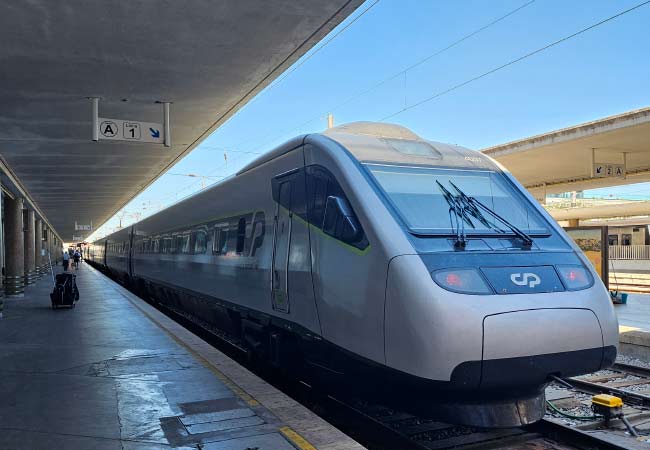
The Alfa Pendular is the express train of Portugal
Lisbon train station
All trains to the Algarve depart from the Estação do Oriente in Lisbon.
Oriente station is to the north-east of Lisbon, GPS: 38.767, -9.099 (link to Google Maps), and is in the Parque das Nações district. The Estação do Oriente is connected to the red metro line, and this metro line also serves the airport.
Oriente is a busy transport interchange with metro, bus and train stations, but it is easy to navigate around, with clear signage and plenty of lifts. Opposite the station is the modern Vasco da Gama shopping centre, with plenty of restaurants and cafés if you need to pass time before a departure.
Related articles: Estação do Oriente
Porto to the Algarve
Two daily train services run between Faro and Porto, with connections available at Tunes. The journey takes 6 hours 37 minutes, with tickets costing €57.40 for second class and €78.90 for first class.
For a journey of this length, the train is the clear choice over driving or the bus. The current timetable is available on the CP website: www.cp.pt/
Porto is a fascinating city well worth including in your trip. It rivals Lisbon for history, atmosphere, and things to see, yet receives a fraction of the tourist crowds.
Related articles: The Algarve to Porto - Guide to Porto
The Algarve regional railway
The second stage of the train journey uses the Algarve regional train to reach your final destination. The connection point depends on which direction you are heading.
For the eastern Algarve (Tavira, Monte Gordo, Olhão), change trains in Faro. For the western Algarve (Lagos, Portimão, Praia da Rocha), the connection is at Tunes. For Albufeira, stay on past Tunes and alight at Ferreiras station, then take a taxi for the 6km journey to the resort centre.
The regional railway is slow. The journey from Lagos to Tunes takes almost an hour, and Faro to Tavira takes around 40 minutes. However, the regional departure times are aligned with the arrival of the Lisbon express trains, so connections are straightforward if following the timetabled routes.
In the western Algarve, the railway runs inland and does not pass close to the main coastal resorts. An onward taxi is required for most destinations. The exception is Lagos, where the train station sits close to the city centre and the main sights are a short walk away. In the eastern Algarve, the towns are generally located close to their stations, so onward travel is minimal.
Algarve train stations are small, typically with two platforms and only a handful of services per day. Most have a ticket office and a café, but little else.
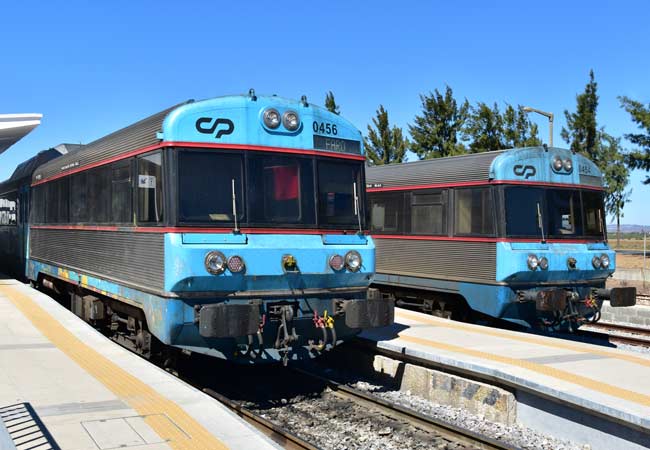
The slow regional train of the Algarve
Lisbon to the Algarve by bus
Bus travel in Portugal is safe and inexpensive. The coaches used by both Rede Expressos and Flixbus are modern and comfortable.
Rede Expressos is the main intercity bus company in Portugal, covering routes throughout the country. It operates as a conglomerate of smaller bus companies, so Lisbon to Algarve services may run under the names Renex, Mundial Turismo, or Rede Expressos depending on the route.
Flixbus is a low-cost operator that serves many of the more popular routes in Portugal. Since it entered the market, bus fares have fallen significantly, making coach travel much cheaper than the train.
Both companies use dynamic pricing, so ticket costs rise closer to the departure date and during periods of high demand. Flixbus is typically the cheaper option when booked well in advance, but its services sell out during peak times and the coaches tend to be busier than the Rede Expressos equivalent.
Rede Expressos - rede-expressos.pt/
Flixbus - FlixBus
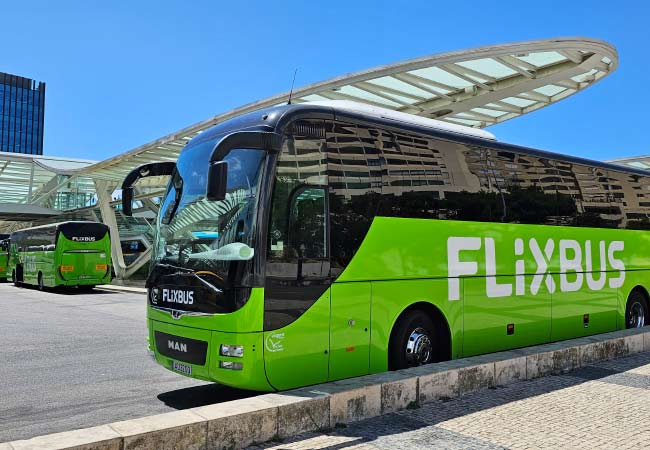
Flixbus in Oriente bus station
Lisbon bus stations
Most Rede Expressos buses depart from Sete Rios bus station (GPS: 38.741, -9.166), the main bus station in Lisbon. It sits on the blue metro line, connected via Jardim Zoológico metro station.
Flixbus services depart from Estação do Oriente bus station (GPS: 38.767, -9.099) in the Parque das Nações district. This station is connected to the train station and served by the red metro line at Oriente metro station.
Always check your ticket for the departure location, particularly when travelling with Rede Expressos. Sete Rios is operating at capacity, so some services now depart from Oriente where there is more space.
Both Sete Rios and Estação do Oriente are large, modern stations with late-opening ticket offices and good facilities. The stations are safe, though pickpockets operate in busy transport hubs, so keep valuables secure.
Related articles: Sete Rios bus station
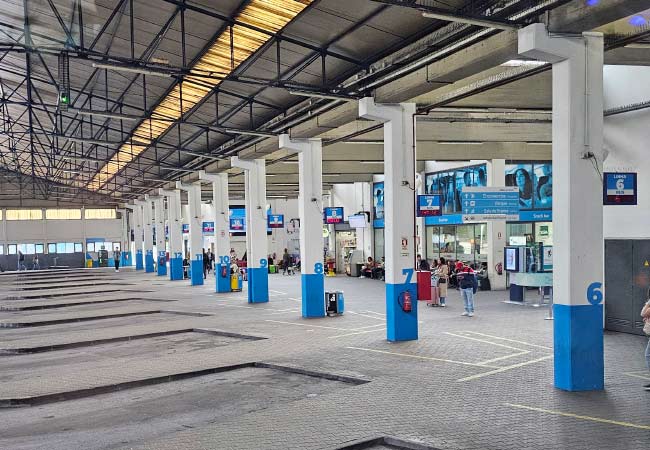
Sete Rios bus station in Lisbon
Driving between Lisbon and the Algarve via the A2 and A22
The driving route from Lisbon to the Algarve follows the A2 expressway, which connects to the A22, the expressway running the length of the Algarve. Both roads are tolled, and the total cost ranges from €20 to €25, almost the same as a train ticket.
Tolls are paid via the Via Verde transponder. If renting a car in Portugal, request one from the hire company. Many Portuguese expressways have automatic toll collection only, with no option to pay by cash or card at a booth, so a transponder is essential. Full details are available at:
visitors.viaverde.pt
For those driving a foreign-registered vehicle, toll payment works differently. See:
www.portugaltolls.com/
To estimate toll costs for any route in Portugal, use the official calculator:
https://
The A2 itself is a dull drive. The road cuts through the interior of the Alentejo region, and there are no noteworthy towns or sights along the way.
The coastal route along the N120 is far more scenic, though it adds considerable time to the journey. This is a single-carriageway road that winds through the countryside, passing through several attractive towns and villages along the way:
Odeceixe - A small village near the Algarve border where the Seixe river meets the Atlantic. The beach sits in a sheltered bay flanked by tall cliffs, and the village itself is a quiet cluster of whitewashed houses with a handful of cafés and restaurants.
Zambujeira do Mar - A clifftop village with a steep path leading down to a wide sandy beach. The village remains low-key and largely untouched by mass tourism.
Vila Nova de Milfontes - The largest town along this stretch of coast and a popular destination for Portuguese holidaymakers. It sits at the mouth of the Mira river, with beaches on both the ocean and the calmer estuary side. The town has a relaxed atmosphere, good restaurants, and makes a practical base for exploring the Alentejo coastline.
Porto Covo - A small, quiet village centred on a traditional square lined with single-storey houses. The coastline here is particularly striking, with rocky coves and hidden beaches.
Sines - A historic port town and the birthplace of Vasco da Gama. The old centre retains some character, with a small castle and views over the harbour, but the outskirts are dominated by a large oil refinery and industrial port. Worth a brief stop rather than a destination in itself.
Do you need a car for Lisbon?
Having a car in the Algarve is great for exploring and discovering hard to reach beaches or villages, but in Lisbon it can be a hindrance. Lisbon has excellent public transport and the ride hailing apps (such as Uber or Bolt) are inexpensive for private travel. Driving in Lisbon can be very demanding, with heavy traffic, erratic driving and severely limited car parking.
A car is useful in the Algarve, but unnecessary in Lisbon.
Our most popular guides to the Algarve
Expert Insight: These guides are curated by Philip Giddings, a travel writer with over 25 years of local experience in Portugal. Since 2008, Phil has focused on providing verified, on-the-ground advice for the Algarve region, supported by deep cultural ties through his Portuguese family. Read the full story here.


























